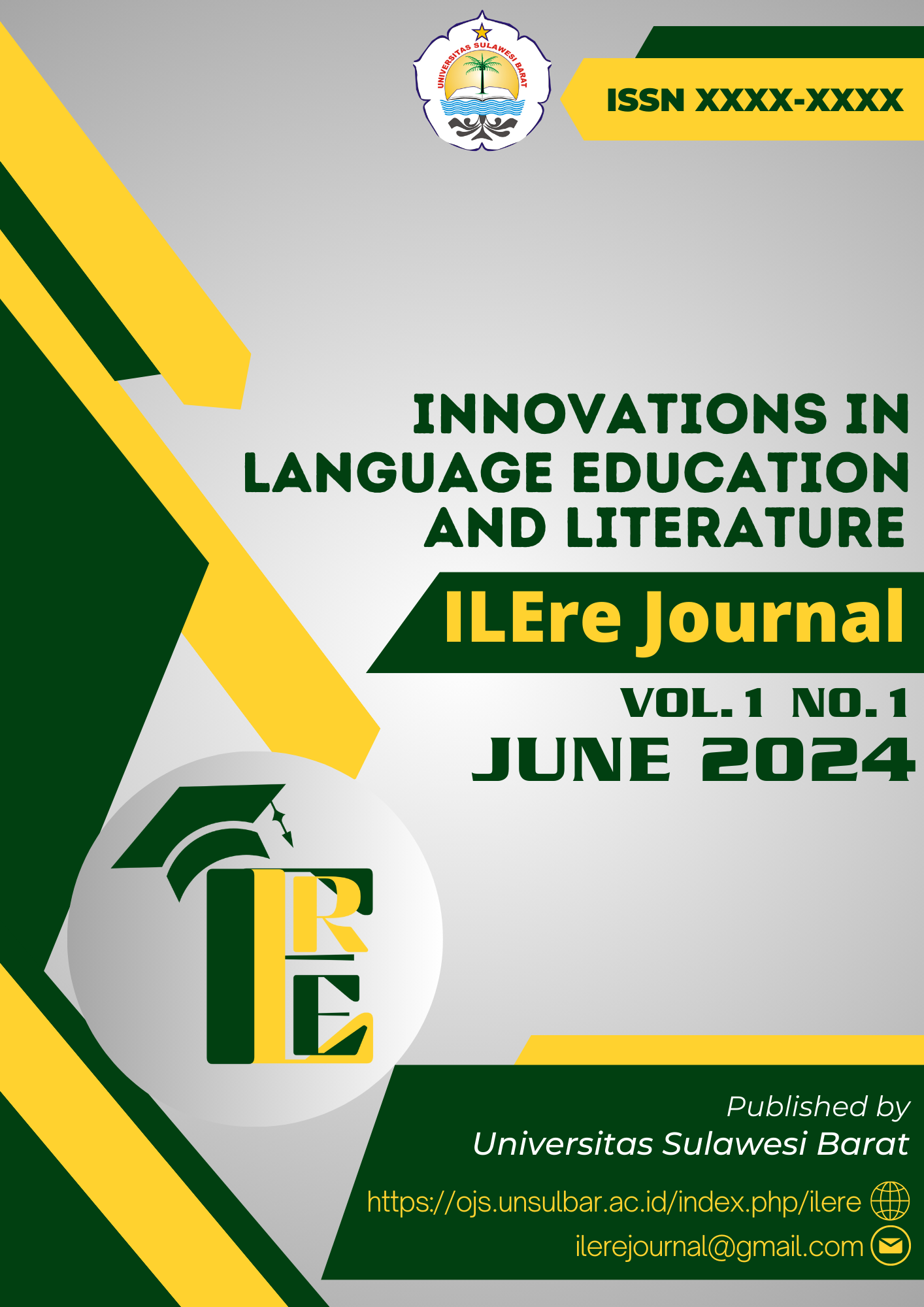Investigating Self-Awareness and Speaking Ability Correlations in Secondary EFL Education
Abstract
This study investigates the correlation between self-awareness and English-speaking ability among second-grade students at SMAN 3 Majene, Indonesia. Employing a quantitative correlational design, the research examined 17 students selected through cluster random sampling from a population of 51. Data were collected using a self-awareness questionnaire assessing emotional awareness, self-assessment, and self-confidence, alongside a speaking ability test. Results revealed high levels of self-awareness among participants, with most reaching the "permanent" level, indicating strong self-reflection capabilities. Speaking abilities were predominantly rated as "good." However, statistical analysis showed a weak correlation between self-awareness and speaking ability, challenging the assumption of a direct link between these variables. This finding suggests that while self-awareness may contribute to internal motivation, it does not automatically translate to enhanced speaking performance in this EFL context. The study highlights the need for comprehensive pedagogical strategies that complement self-awareness development with targeted language instruction to improve EFL speaking skills effectively.
References
Ahmad Al-Khotaba, H. H., Alkhataba, E. H. A., Abdul-Hamid, S., & Ibrahim, B. (2020). Foreign Language Speaking Anxiety: A Psycholinguistic Barrier Affecting Speaking Achievement of Saudi EFL Learners. SSRN Electronic Journal. https://doi.org/10.2139/ssrn.3512637
Aisyah, S. (2020). The Correlation Between Students’ Self-Esteem and Students’ Speaking Ability of Eleventh Grade at SMAN 7 Maros [Undergraduate Thesis]. Universitas Muhammadiyah Makassar.
Alawiah, S., & Suwarsito, S. (2018). The Effects of Student’s Perception on Role Play Technique and Students’ Learning Motivation on Speaking Skills. Wanastra: Jurnal Bahasa Dan Sastra, 10(1), 101–109. https://doi.org/10.31294/w.v10i1.3041
Arabsarhangi, M., & Noroozi, I. (2014). The Relationship between Self-awareness and Learners’ Performance on Different Reading Comprehension Test Types among Iranian EFL Elementary Learners. Theory and Practice in Language Studies, 4(4). https://doi.org/10.4304/tpls.4.4.675-685
Butarbutar, R., & Karnine, S. M. B. B. V. K. S. V. (2024). Blended Snowballing Discussion Technique and Collaborative Learning Pedagogy in EFL Speaking. GLENS: Global English Insights Journal, 1(2), 42–54. https://doi.org/10.61220/glens.v1i2.338
Creswell, J. W., & Creswell, J. D. (2017). Research design: Qualitative, quantitative, and mixed methods approaches. Sage publications.
Dewi, D. S., & Ervayuni, A. (2021). Self-Awareness and Speaking Skill of Vocational Students of Sinar Metta Batam. ANGLO-SAXON: Jurnal Ilmiah Program Studi Pendidikan Bahasa Inggris, 12(1), 19–30.
Etikan, I., Musa, S. A., & Alkassim, R. S. (2016). Comparison of convenience sampling and purposive sampling. American Journal of Theoretical and Applied Statistics, 5(1), 1–4.
Isma, A., & Baharuddin, A. F. (2022). Exploring Students’ Willingness to Communicate (WTC) in Indonesian EFL Classroom. Proceedings of English Linguistics and Literature, Vol. 3, pp. 78–85. Universitas Negeri Semarang.
Isma, A., Hermansyah, S., Ramadhani, Y. R., Lestari, I. W., Evenddy, S. S., Talenta, P. I., Sastri, L., Rasmin, L. O., Febrianto, A. R., & Pavita, M. D. A. (2023). Teaching English to 21st Century Learners (1st ed.). Yayasan Kita Menulis.
Isma, A., Lestari, I. W., Rohimajaya, N. A., Hardiyanto, A., Susanti, E., Meisarah, F., Novia, S., Kuning, D. S., Hamer, W., & Rasmin, L. O. (2024). Digital Tools for English Language Learning: A Comprehensive Guide for EFL Educators (1st ed.). Yayasan Kita Menulis.
Isma, A., & Nur, S. (2023). Examining the Reading Performance and Problems among Students in Indonesian Higher Education. Seltics Journal: Scope of English Language Teaching, Literature and Linguistics Journal, 6(1), 12–23. https://doi.org/10.46918/seltics.v6i1.1763
Izumi, G. C. (2017). The Study between Students’ Anxiety and Speaking Ability at the First Grade Students of SMA Negeri 1 Kabupaten Tangerang [Undergraduate Thesis]. Fakultas Keguruan dan Ilmu Pendidikan.
Khan, N., & Ali, A. (2010). Improving the speaking ability in English: The students’ perspective. Procedia - Social and Behavioral Sciences, 2(2), 3575–3579. https://doi.org/10.1016/j.sbspro.2010.03.554
Lestari, I. W., & Isma, A. (2019). Using Translation Activity to Improve the Students’ Vocabulary Mastery of the Eleventh Grade of Social Class at SMAN 3 Bojonegoro. IDEAS: Journal on English Language Teaching and Learning, Linguistics and Literature, 7(2), 185–197. https://doi.org/10.24256/ideas.v7i2.1034
Manalulallaili, M., Hasanah, A., Herizal, H., & Silvita, A. (2018). The Correlation between Emotional Intelligence and Speaking Achievement of Eight Grade Students of SMPN 46 Palembang, South Sumatera, Indonesia. JELT (Jambi-English Language Teaching), 3(2), 68–83.
Nugrawati, S. (2016). The Correlation between Self-Awareness and Students’ Learning Style (A Descriptive Study at English Department [Undergraduate Thesis]. Universitas Muhammadiyah Makakassar.
Pitriani, O. (2021). The Correlation between Students’ Emotional Intelligence and Their Speaking Ability at the Tenth Grade of SMAN 01 Kotabumi Academic Year 2020/2021. Griya Cendikia, 6(2), 319–332. https://doi.org/10.47637/griya-cendikia.v6i2.107
Putri, S. O., & Wijayanti, N. S. (2018). Faktor yang mempengaruhi kemampuan berbahasa Inggris mahasiswa pendidikan administrasi perkantoran. Jurnal Pendidikan Administrasi Perkantoran-S1, 7(2), 155–164.
Qowimah, S. N., Almahira, K. J., Rahma, D. A., Satrio, A. B., Nuzul, H. M., Puteri, S. N. Y., Lusiana, N., & Andyarini, E. N. (2021). Hubungan Self Confidence dan Self Awareness dengan Komunikasi Efektif pada Mahasiswa. Indonesian Psychological Research, 3(2), 109–120. https://doi.org/10.29080/ipr.v3i2.565
Sutton, A. (2016). Measuring the effects of self-awareness: Construction of the Self-Awareness Outcomes Questionnaire. Europe’s Journal of Psychology, 12(4), 645–658. https://doi.org/10.5964/ejop.v12i4.1178
Tokoz-Goktepe, F. (2014). Speaking Problems of 9th Grade High School Turkish Learners of L2 English and Possible Reasons for those Problems: Exploring the Teachers and Students’ Perspectives. Procedia - Social and Behavioral Sciences, 116, 1875–1879. https://doi.org/10.1016/j.sbspro.2014.01.487















 Email: ilerejournal@gmail.com
Email: ilerejournal@gmail.com
